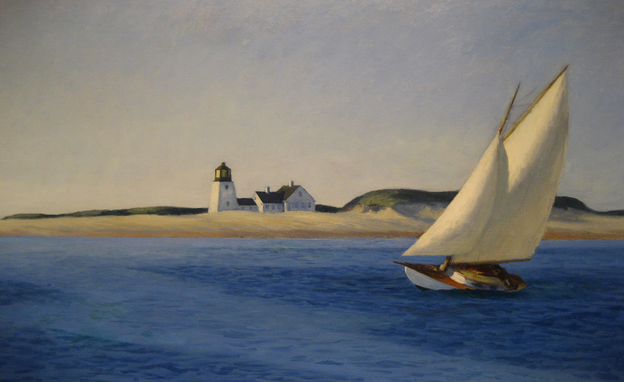EDWARD HOPPER
Study for "OFFICE at NICE'
Pencil on Paper
Edward Hopper has something of the lonely gravity peculiar to Thomas Eakins, courageous fidelity to life as he feels it to be. He also shares Winslow Homer's power to recall the feel of things. For Hopper, this feel is insistently low-key and ruminative. He shows the modern world unflinchingly; even its gaieties are gently mournful, echoing the disillusionment that swept across the country after the start of the Great Depression in 1929. Cape Cod Evening(1939) should be idyllic, and in a way it is. The couple enjoy the evening sunshine outside their home, yet they are a couple only technically and the enjoyment is wholly passive as both are isolated and introspective in their reveries. Their house is closed to intimacy, the door firmly shut and the windows covered. The dog is the only alert creature, but even it turns away from the house. The thick, sinister trees tap on the window panes, but there will be no answer.
NIGHTHAWKS
HOPPER'S Most FAMOUS PAINTING
Paintings such as Nighthawks (1942) convey a mood of loneliness and desolation by their emptiness or by the presence of anonymous, non-communicating figures. But of this picture Hopper said: `I didn't see it as particularly lonely... Unconsciously, probably, I was painting the loneliness of a large city.' Deliberately so or not, in his still, reserved, and blandly handled paintings Hopper often exerts a powerful psychological impact -- distantly akin to that made by the Metaphysical painter de Chirico; but while de Chirico's effect was obtained by making the unreal seem real, Hopper's was rooted in the presentation of the familiar and concrete.
PORTRAIT of NEW ORLEANS
"I NEVER WOULD of GUESSED IT"
Looks Like Somewhere in Middle America or Upstate New York
The Long Leg
Love This Painting
I Did a Small Copy of It Myself
That Hangs on My Parlor Wall
CHOP SUEY




